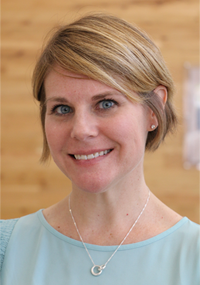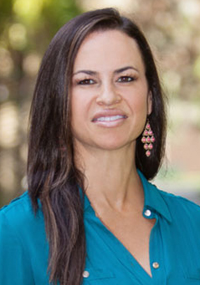Impact of Preeminence Initiative: Progress in Research on Swallowing
In the last issue of On the Same Page, I summarized the impact of the UF Preeminence Initiative for the University of Florida and UF Health. A myriad of benefits have occurred, as expressed in broad terms: new research awards, including program projects and center grants; enhanced interdisciplinary collaborations; high-impact publications; new training grants and other educational enhancements; honorific awards; and a number of positive ripple effects. In more specific terms, however, in more personal terms, the stories of individual faculty who joined UF Health provide concrete examples of how this university initiative has made a difference.
In this spirit, this issue of OTSP follows the stories of two such faculty recruited under the Preeminance Initiative - Emily Plowman, Ph.D., and Ianessa Humbert, Ph.D. - who were appointed in the Department of Speech, Language and Hearing Sciences within the College of Public Health and Health Professions. These faculty members, who study dysphagia (difficulty swallowing) joined Karen Hegland, Ph.D., to complement and extend the program of research on dysphagia that she had already established. The beginnings of this story were told in the June 2015 issue of OTSP, which explained why each of these three faculty members became interested in dysphagia research and how they found their way to UF. In this issue, we learn how things have worked out so far.
These faculty members have developed their research under the leadership of Susan Nittrouer, Ph.D., chair of the Department of Speech, Language and Hearing Sciences, to whom I am indebted for providing background on the subject matter of this newsletter.
Even if you're not a true "foodie," my hunch is that you nonetheless have a strong and special relationship with food and drink. Eating and drinking are associated with some of our most pleasurable experiences and most important social traditions. The smell of food cooking in the kitchen generates anticipation for the wonderful tastes to come. But what if you were unable to enjoy the foods warming on your range or delivered to your restaurant table? Every year roughly 10 million Americans encounter this problem. Patients who experience difficulty swallowing, or who have a complete inability to swallow, face the prospect of slowly declining health and quality of life.
Dysphagia is a common sequelea of many diseases, including head and neck cancer, stroke and neurodegenerative diseases such as Parkinson's disease and amyotrophic lateral sclerosis, or ALS. Dysphagia can lead to dehydration, malnutrition, aspiration pneumonia, increased lengths in hospital stays and even death.
Enter the speech-language pathologist. Although the main purview of this profession has traditionally been in the area of communication disorders, the act of swallowing shares the anatomical structures responsible for voice and speech production. This makes diagnosis and treatment for dysphagia a natural extension for speech-language pathologists.
At the University of Florida, the Department of Speech, Language, and Hearing Sciences within the College of Public Health and Health Professions has taken the lead in training future speech-language pathologists in the treatment of dysphagia. The three faculty members who are the subject of this newsletter, Drs. Hegland, Humbert and Plowman, have added significantly to the UF dysphagia program; in a short time they have each secured additional National Institutes of Health funding as principal investigators and collectively have established UF as a national powerhouse in the field.
Besides collaborations with one another, Drs. Hegland, Humbert and Plowman work with colleagues from otolaryngology, neurology, physical therapy, physiologic sciences and neurogenetics. They also mentor undergraduate and graduate students, including 11 doctoral students and two clinical fellows. Their goal? To understand the physiologic mechanisms that cause dysphagia in different patient populations, develop new treatments and, ultimately, decrease the physical, economic and psychosocial burdens associated with swallowing disorders. But even though they share this common goal, each investigator addresses it in her own unique way. While the educational and professional roads that lead to UF for these faculty were described in my June 2015 newsletter, the next chapter in their stories will be told here.
Karen Hegland, Ph.D.

Dr. Hegland, a quadruple Gator, had already established a research program in dysphagia, studying airway protection mechanisms in patients with neurodegenerative disease. These individuals can lose strength and coordination in the muscles involved in swallowing, making it more difficult for them to protect the airway. Following her NIH R21 grant to study cough and swallowing problems in patients with Parkinson's disease, last summer she received the exciting Notice of Award for her R01, titled "Mechanisms of airway protection dysfunction in Parkinson's disease," which will extend from Sept. 1, 2017 to Aug. 31, 2022.
Dr. Hegland's thoughts about her new colleagues and ongoing collaborations emphasize synergies: "Our collaborative efforts have proven fruitful, not only in terms of research funding, but also in student training, mentorship and friendship. This synergy, along with my collaborations with researchers and clinicians from neurology, physiological sciences, physical therapy, hearing research and otolaryngology, has allowed for the continued development of a rich environment for the advancement of our patient-centered research programs, and training future generations of clinicians and scientists."
Ianessa Humbert, Ph.D.

Dr. Humbert's research program focuses on the physiological mechanisms of swallowing disorders and the development of rehabilitation strategies. Her interests center on the peripheral and central control of swallowing in normal and impaired function and, more recently, on developing an understanding of the neural mechanisms underlying normal and disordered swallowing and how principles of motor learning can be applied to examine these as well as swallowing interventions.
To support this research, Dr. Humbert has been awarded two R01 grants, one titled "Laryngeal Adaptation in Speech and Swallowing," and the other titled "Applying Motor Learning Principles to Dysphagia Rehabilitation." She states that she "came to UF to expand my collaborations. First, I hoped to finally work with a group of scientists with similar interests. Faculty who specialize in swallowing are frequently the lone experts in their institute, which can limit the breadth and creativity with which swallowing impairments are studied. Well, I found what I sought at UF! Obviously, I had natural synergies with Drs. Plowman and Hegland. However, productive and exciting new directions have also emerged with Dr. Evangelos Christou, a professor in applied kinesiology who studies movement control in limbs, and with Dr. Andrew Lotto, a professor in my department who studies the complex perceptual processes involved in hearing, speech and music. Each of these collaborations challenge me to work at the 'edges' of my knowledge base as it relates to science and clinical practice in swallowing."
Emily Plowman, Ph.D.

Dr. Plowman has a passion for advancing clinical care in patients with ALS, the devastating disease that affected Stephen Hawking for most of his life. She has worked to advance the field's understanding of the mechanisms of this disease, and to develop new management techniques that may extend survival and improve the quality of life for these patients.
Here are her thoughts about her UF experience to date: "Prior to joining UF, my research program operated in an insular fashion and what felt like a 'research silo'. When I arrived to UF I was immediately surprised and impressed with the abundance of opportunities to work and interact closely with scientists from other related disciplines and the supportive infrastructure that encourages interdisciplinary science to flourish. Indeed, on a given week I meet and work with clinicians and scientists that span the fields of: neurogenetics, neuroscience, neurology, physiological sciences, otolaryngology, engineering, radiology and biostatistics within the UF Health umbrella. Although there are many, highlights of these interactions include working with Dr. Gordon Mitchell (Physical Therapy), Dr. Laura Ranum (Neurogenetics), Dr. Paul Davenport (Physiological Sciences) and Dr. James Wymer (Neurology). These daily interactions have widened the lens with which I view the clinical problems and knowledge gaps my research program seeks to answer and led to the development of creative and novel research ideas that has resulted in seven successful grant applications since my arrival (NINDS, NICHD, NIDCD, ALS Association, CTSI)." Of particular note is the recent funding of her R01 grant from the National Institute of Neurological Disorders and Stroke titled "Delineating Physiologic Mechanisms of Swallowing impairment and Decline in ALS," which will extend from April 1, 2017 to March 31, 2022.
Although swallowing and associated problems of airway protection can present life-threatening challenges to affected patients, they are being helped every day at clinics in the UF Health system, thanks to highly trained speech-language clinicians, and researchers like Drs. Hegland, Humbert and Plowman.
The Power of Together,
David S. Guzick, M.D., Ph.D. Senior Vice President for Health Affairs, UF President, UF Health
About the author
